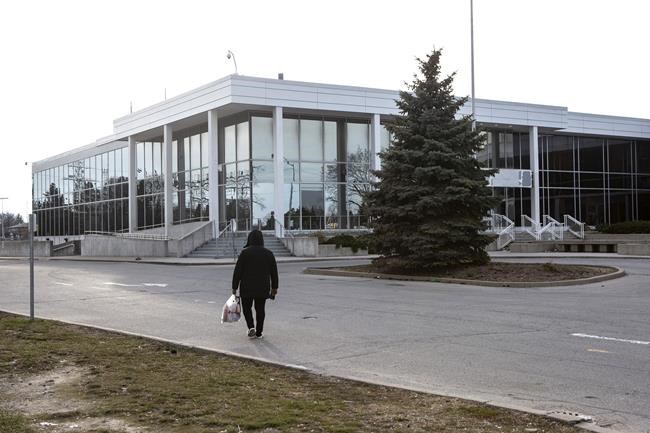TORONTO — Advocacy groups and shelter operators called Friday on all levels of government to immediately help Toronto's overstretched shelter system cope with the high numbers of refugee claimants who are unhoused.
Representatives from the Rwandan Canadian Healing Centre, Soujourn House, Christie Refugee Welcome Centre and other groups said the federal, provincial and municipal governments should be ashamed for not doing enough to help asylum seekers who've recently arrived in the city.
Kizito Musabimana of the Rwandan Canadian Healing Centre said advocates working with asylum seekers are tired of different levels of government not taking accountability, and said they should be working together to solve the bed shortage in Toronto's shelter system.
"The federal government is pointing fingers ... the city was pointing fingers or is saying they need help, and then the provincial government sometimes is not at the table," Musabimana said during a news conference Friday as some asylum seekers sat on the sidewalk nearby, awaiting spots in the shelter system.
"We want everybody to get at the table and answer to everybody."
Asylum seekers have been gathered for days outside a downtown Toronto centre that supports those who are homeless by providing access to food, washrooms and other amenities. Some asylum seekers have been sleeping on the sidewalks outside as they hope for a space in the shelter system.
Ssali Asuman Najib, an asylum seeker from Uganda who said he was fleeing political persecution, has been living outside the centre since he arrived in Canada two weeks ago.
He said he was given an intake number for shelters in the city but has not been told how long he might have to wait before a spot opens up.
"I'll be patient and wait until they can help me," Najib said. "We need the government to fight for us, we are good people."
Brian Michieka, a 28-year-old asylum seeker who fled due to what he said was political persecution in Kenya, said he was outside the centre for three weeks before being able to get a bed at a downtown homeless shelter.
"Everyone is fighting for themselves," Michieka said.
"Coming to this country, Canada, you don't expect this. You don't really feel like you're in a new country – you feel lonely."
Deputy Mayor Jennifer McKelvie said in May that the number of asylum seekers in Toronto's shelter system grew by 500 per cent in 20 months from a low of 530 per night in September 2021 to more than 2,800 throughout the month of May.
She announced that Toronto would be referring asylum seekers away from at-capacity shelters towards federal programs, and called on the federal government to provide the city with more funding.
The federal government has said it has given $700 million to provinces and municipalities to support newcomers seeking emergency shelter, with $215.4 million going to Toronto.
Mayor Olivia Chow, who took office on Wednesday, said Friday that staff from the city, province and federal government were set to meet to discuss the issue that day, and noted the pressures on Toronto's shelter system.
"Toronto’s shelters are full. Over a third of their residents are refugees. Our city is currently serving 3,000 refugees each night, including those fleeing the war in Ukraine, in both dedicated refugee shelter spaces and in our base shelter system," she wrote in a statement.
"The federal government must recognize this is a crisis and partner with the city to address it."
Chow said she was hoping Friday's meeting between the three levels of government would bring results.
"I am looking for concrete solutions for the end of the immediate crisis, as well as a longer term action plan to provide refugees dignified shelter and housing when they arrive," she said.
The new mayor said she wants Ottawa to cover the $157 million Toronto is spending for existing refugee shelter spaces, and support with additional housing, shelter space and personnel.
"Further, I am seeking partnership that includes the city contributing on a significant expansion of the Canada-Ontario Housing Benefit, a rent supplement program, so that we can move people into housing," she said. "People who come to Canada fleeing persecution deserve better than this."
Chow issued a separate statement after the meeting involving senior city staff and various provincial and federal deputy ministers, calling it "productive" and "focused."
"The city, provincial and federal governments all see and understand the urgent need to address the immediate crisis, and to develop and implement longer-term solutions so that newly arrived refugees and asylum seekers have the support and shelter they deserve," she said in the statement.
"All parties have agreed to bring specific actions for space and resources to a senior operations and crisis management table on Tuesday next week that can be implemented right away."
The federal government said earlier Friday that "housing and supports for asylum seekers are the responsibility of provinces and municipalities."
"The federal government has been providing assistance and will continue to do so, but we need full engagement from all levels of government at the table," Bahoz Dara Aziz, a spokesperson for Immigration, Refugees and Citizenship Minister Sean Fraser, wrote in a statement.
The Ontario government claimed Ottawa was "underfunding" the province by $480 million for housing and homelessness.
"Resettlement and support for refugees is a federal responsibility," Victoria Podbielski, a spokesperson for Ontario Municipal Affairs and Housing Minister Steve Clark, wrote in a statement.
"These dollars are needed now more than ever to support our most vulnerable Ontarians and build strong communities in every corner of the province."
This report by The Canadian Press was first published July 14, 2023.
William Eltherington and Fakiha Baig, The Canadian Press

